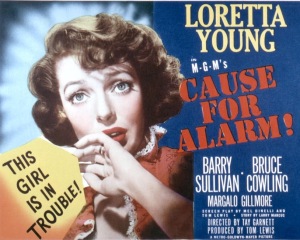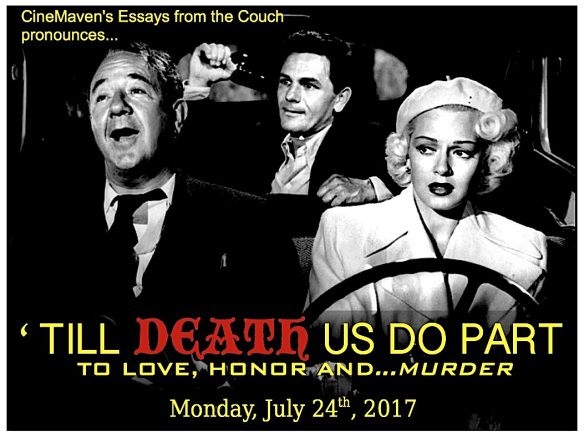For every “happily ever after” movie romance, there’s one that didn’t work out quite so well. As part of her July blogathon “Till Death Us Do Part: To Love, Honor and Murder,” Theresa Brown (CineMaven) has opened the discussion on the fascinating topic of movies revolving around matrimonial murder.
You can find contributions on an impressive list of films on Theresa’s blog, CineMaven Essays from the Couch, via this link: https://cinemavensessaysfromthecouch.wordpress.com/2017/07/24/till-death-us-do-part-2/
Some titles are very well known. Others, like my choice, “Cause for Alarm!,” may not be as familiar but are equally worth reading about and watching.
I chose “Cause for Alarm!” because of its twist on a familiar formula and a nifty surprise ending. The murder plot is dispatched quite quickly, propelling the movie into a taut edge-of-your-seat thriller about a woman frantically seeking a letter that frames her for her husband’s death.

The 1951 film noir stars Loretta Young as Ellen, a woman whose sick (physically and mentally) husband’s paranoia has deadly side effects. He’s played by Barry Sullivan who effortlessly moves from a smarmy charmer into an obsessive man blinded by jealousy. Not only does he want to kill her, he wants to frame her for his murder. How he thinks he can kill her if she kills him first underlines his instability.
Directed by Tay Garnett in only 14 days, the film’s compact shooting schedule adds to the sense of urgency running through it. Five years earlier, Garnett directed the classic film noir “The Postman Always Rings Twice.” Here, he crafted a film lighter in tone and look. Though familiar film noir elements are evident (shadows, unbalanced angles, extreme close-ups), the sunny-day setting in peaceful suburbia feels like this could happen to anyone.
***
On a well-manicured street, behind a white picket fence stands a charming house with flowers in window boxes. It’s an idyllic scene but one thing seems oddly out of place. That fence, a symbol of the American dream, dramatically sets the house apart from its neighbors. Soon, we see the fence as a metaphor for Ellen who is fenced in by her life and fate.
“This is where I live. I’m a housewife,” she says as the camera slowly zooms in to a sign that reads “Quiet Illness Within.”
Inside, Ellen is vacuuming in a modest knee-length skirt and a ruffled shirt. She appears overwhelmed, sweating and wiping her face with a handkerchief. At first it’s simply to sop up the sweat, but later the repeated gesture becomes a nervous tick.
This ordinary Tuesday in July will become “the most terrifying day” of her life and we’re thrust right in it with her.
Ellen’s bed-ridden husband is upstairs writing a letter: “My wife and close friend who is also my physician are planning to kill me,” the letter begins, putting the audience on an edge we won’t leave until the movie ends.
In a quick flashback, we see the start of this “triangle.” Ellen is with her good friend Dr. Ranny Grahame (Bruce Cowling) who is clearly smitten but his schedule doesn’t allow for dating. He asks Ellen to cheer up a soldier-patient while he waits for his friend, George, also a soldier. In a film noir meet-cute, George is conveniently waiting in the injured soldier’s room and the requisite case of mistaken identity occurs. George is clearly a bad boy, but Ellen seems to be too naive to notice.
“What can I do for you?” she asks.
“I can think of a lot of things,” he cracks.
Despite her anger at learning his true identity, Ellen falls for him during his two-week leave. As she passionately embraces him goodbye at the airport, George looks over her shoulder at Ranny and shrugs – then smirks. He is not one of the good guys.
“Are you sure he’s right for you, Ellen?” George asks, almost pitifully.
“I don’t know,” she replies honestly. Ouch.
***
Back to present day where George’s mental abuse of Ellen is raging: he quizzes her down to the minute on how long it took her to get him medical help; questions her on anyone she speaks to, even a child; watches her from the bedroom window, then denies he left his bed.

All the while, she toils away, a prisoner in her own house, wearily taking care of her husband. She yearns for companionship, to talk to her neighbors but that’s forbidden. She chats a few minutes with the mailman when she gives him a letter and enjoys time with the little boy, Hoppy, who wants cookies.
“I always felt better talking to Hoppy,” she says.
But that happiness is short-lived as her husband’s anger rises. He recounts a chilling childhood story of beating a kid bloody when he dared to touch a prized toy. “Where his face had been so white, it was all blood,” George says, adding when his mother told him to give the toy to the other boy, he dropped it to the floor and violently smashed it. “It was mine more than it had ever been before,” he says, his face contorting. He’s not just talking about the toy – he’s talking about Ellen. His hands move to her neck in a threatening caress as he warns her that Dr. Grahame (he no longer calls his friend by his first name) will meet the same fate as the boy.
Finally Ellen sees what the audience has known all along – George is psychotic. Terrified, she goes into the bathroom, giving George time to lock the door and grab a gun from the dresser. He taunts Ellen with the gun and tells her the letter she mailed implicates her in his death by poisoning. He’s left a trail of “witnesses” including the druggist she called to refill his prescription early. He’s a bit crazy, but he’s thought this through. Ellen pleads for her life, then he suddenly drops dead from heart failure. Convenient, yes, but this is where the movie’s big shift happens.
“He died trying to kill me,” Ellen says, finally safe. Then she remembers the letter.
From there, the movie morphs into a tense thriller as she tries to retrieve the letter. Distraught, Ellen is an odd figure running past perfect little houses, even knocking people over. She catches up to the postman but when he can’t give her the letter, she becomes hysterical.

Ellen is having a breakdown. Ringing bells – the telephone, doorbell, ticking clock – are reminders she’s running out of time. With every step, there’s another witness to her actions: the nosy neighbor; the druggist calling about that odd refill; the business associate who aggressively insists on seeing George who is dead upstairs. Even when Ellen wants to tell George’s Aunt Clara, the older woman thinks she wants to confess about an affair and says to keep it to herself.
When all seems lost, Ellen makes a last-ditch effort to keep Ranny away so he won’t be implicated in George’s death, but he still shows up.
“I did everything wrong just like he said I would,” she cries to Ranny as the doorbell rings. A shadowy figure looms behind the sheer curtains, blocking the sun. Her time is up.
I refuse to spoil the ending since it’s what picks the film up a notch for me. But I will say it left me laughing and may do the same for you. When was the last time you could say that about a film noir?


I ran to see this movie before reading your review. I won’t spoil it, but it does come at film noir different angle. Poor Loretta! She was certainly put through the ringer. No one can do hysterical like Loretta.
The movie took suburbia and made it a bit treacherous for Loretta to navigate in. Interesting slant.
* * * *
I like your easy breezy style of writing, Toni. It made me want to see the movie. ThanxXx for making my blogathon your first publishing port o’ call. I look forward to reading more of your reviews. You have a nice style.
LikeLike
Thanks for your kind words, Theresa. And a special thanks for all the time you’ve put into the blogathon and for letting me participate.
LikeLiked by 1 person
This sounds like a very interesting film! I’ve never seen it but will keep an eye out for it now. Great review.
LikeLike
Thanks! It means a lot that I can introduce someone to a film they haven’t seen.
LikeLiked by 1 person
I LOVE, LOVE, LOVE this movie. Ellen was one of my “Desperate Housewives of Film Noir” in an article I wrote ages ago. And I LOVE, LOVE, LOVE your look at a movie that always puts that knot in my stomach. PS: I also kinda love Barry Sullivan, so I get why Ellen married him, but… Guys!
LikeLike
Hi. Great to hear of someone else who enjoys this film. I was never a Loretta Young fan until I saw it. I would like to read your article – I love the title.
LikeLike
You’re very kind. I was thrilled to read your choice and article. It’s like we’re part of a secret club and we’re letting everybody in on it.
My post: http://www.caftanwoman.com/2012/02/desperate-housewives-of-film-noir.html
LikeLike
Thanks for sending the link. I enjoyed your post quite a bit – again it’s a clever title/idea. I haven’t seen two of the movies and so I’ll be looking for those to watch. I liked your take on “Cause for Alarm!” too.
LikeLike
I haven’t seen this one yet but – happily – it’s on YouTube. (Yay!) I’ve got it bookmarked, and am looking forward to seeing it. Thanks for the introduction. 🙂
LikeLike
You are welcome. I hope you enjoy it, too. Let me know!
LikeLiked by 1 person
I’ve only just discovered your blog via another blog, and I look forward to reading your articles. I love reading other peoples takes on classic film. I’m also a classic film blogger, who quite often hosts blogathons. I’m hosting another one later in the year, and I would love to invite you to participate. Here is the link below with more details.
https://crystalkalyana.wordpress.com/2017/07/20/announcing-the-spencer-tracy-katharine-hepburn-blogathon/
LikeLike
Hi. Thanks for your note. I’m glad you discovered my new blog – thanks to the “Till Death Us Do Part’ Blogathon. I also love reading what others have to say about classic movies. Thanks also for the offer to participate in your blogathon later in the year. That would be great.
LikeLiked by 1 person
Hi. Thanks for your reply. I’d love to have you join my blogathon later in the year. Let me know what topic you wish to write about?
LikeLike